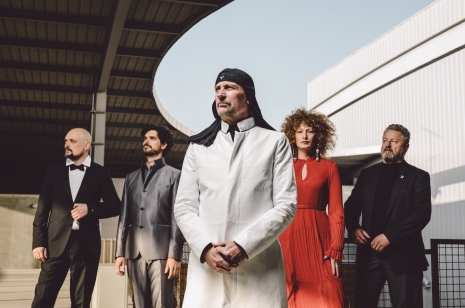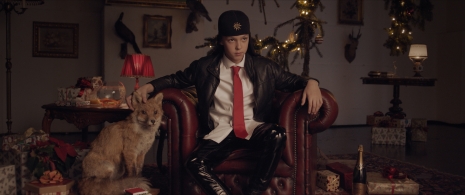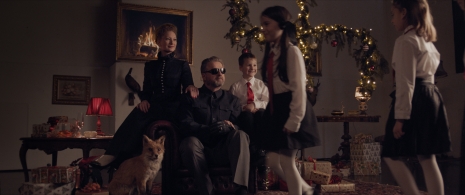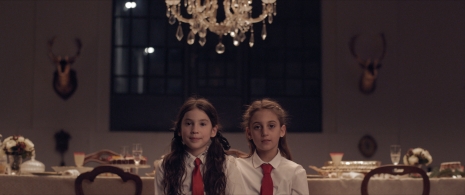
Photo by Ciril Jazbec
The Sound of Music ends with the von Trapp family’s escape from the Nazis through the Alps, crossing from annexed Austria into neutral Switzerland. Or that’s how the stage version ends; the closing shot of the 1965 film is ambiguous. In it, the von Trapps appear to be going in the wrong direction, fleeing into the Bavarian, rather than the Swiss, Alps.
In fact, the mountain at which Robert Wise chose to film the last shot of The Sound of Music was the Obersalzberg, the site of Hitler’s mountain retreat at Berchtesgaden. Once you recognize the location, the end of the movie takes on a horrible significance: as they hike up the Obersalzberg, singing “Climb Ev’ry Mountain (Reprise),” Georg and Maria von Trapp are leading their brood on a death march to the Nazis’ second headquarters. We can easily imagine these Hollywood von Trapps wandering too close to the Berghof after the last notes of the song have died in the chill air, and the camera, like the guilty eyes of Buñuel’s Christ in L’Age d’Or, has averted its gaze from earthly things.
Laibach’s new film “So Long, Farewell” begins with this cinematic wrong turn into horror. The group has been interpreting The Sound of Music since 2015, when, as the first Western (?) band ever to perform in North Korea, Laibach included a number of songs from the musical in their set. In this, the latest video from Laibach’s Sound of Music album, the singing family has not escaped the Nazis—note the swastika-shaped Christmas tree from John Heartfield’s “O Tannenbaum in deutschen Raum, wie krumm sind deine Äste!“ ripped from its parodic context, as a fir is cut from the earth—but, because it is a special time of year, the children are permitted to leave the basement for a few minutes to sing for the adults.
Speaking with a single voice, Laibach answered my questions about “So Long, Farewell” by email. The film follows our conversation below.

Please remind us why Laibach chose The Sound of Music for the performances in North Korea.
Laibach: Throughout our career we’ve been looking for an opportunity to sink our teeth into The Sound of Music. When we received an invitation to perform in Pyongyang, we knew the moment had finally arrived. The Sound of Music is probably the only piece of American pop culture that is not only allowed, but also actively promoted by North Korean authorities. For years now the musical has been part of their school curricula. It seemed only natural that we address the people of North Korea with something as universal as The Sound of Music, therefore we decided to create the concert program around our interpretations of the songs from this musical. The Sound of Music story really fits well into the North Korean situation and can be understood affirmatively, but also subversively – very much depending on the point of view.
It looks to me as if, in Laibach’s telling of The Sound of Music, the von Trapp family does not escape capture by the Nazis, and a sinister patriarch played by Ivan Novak takes the place of Baron von Trapp. The appearance of Milan Fras as the Reverend Mother further complicates the picture: does the abbess sanction this ghastly ménage by her presence? What is the scenario of the “So Long” video?
“So Long” is in fact more a short film than the music video. The original film is, of course, the first of all the apotheosis of Hollywood entertaining industry standards and clichés, but there are many – not even very well hidden – perverse twists in it, full of sexual and psychoanalytical connotations. Slavoj Žižek has a very thorough (and very Laibachian) observation, claiming that officially the film is in principle showing Austrian resistance to Hitler and the Nazis, but if you look at it closely, you see that the “Nazis are presented as an abstract cosmopolitan occupying power, and the Austrians are the good small fascists, so the implicit message is almost the opposite of the explicit message.” No wonder that Austrians officially don’t like this film much, or maybe they are only denying it on the surface and watching it secretly in their cellars. This “hidden reverse” may also be the reason why the movie was so extremely popular, Žižek argues, because it “addresses our secret fascist dreams.” (Which is an interesting assertion, considering most of the people who created the original musical were Jewish.) Catholicism, of course, plays a key role in The Sound of Music film, therefore it represents an important stance in the “So Long, Farewell” miniature as well. On the surface, Catholicism portrays itself as being all about harsh moral discipline and strict rules. But, under the surface, it provides opportunities for great license, including sexual license. You can have your cake (feeling righteous morally, identifying with this “morally strict” organization) and eat it too (providing opportunities to have fun and play around). According to Žižek the power of the film resides in its obscenely-direct staging of embarrassing intimate fantasies. The film’s narrative turns around resolving the problem stated by the nuns’ chorus in the introductory scene: “How do you solve a problem like Maria?” The proposed solution is the one mentioned by Freud in an anecdote: Penis normalis, zwei mal taeglich… Recall what is arguably the most powerful scene of The Sound of Music: after Maria escapes from the von Trapp family back to the monastery, unable to deal with her sexual attraction towards Baron von Trapp, she cannot find peace there, since she is still longing for the Baron; in a memorable scene, the Mother Superior summons her and advises her to return to the von Trapp family and try to sort out her relationship with the Baron. She delivers this message in a weird song “Climb Ev’ry Mountain!” whose surprising motif is: Do it! Take the risk and try everything your heart wants! Do not allow petty considerations to stand in your way! The uncanny power of this scene resides in its unexpected display of the spectacle of desire, an eros energumens which renders the scene literally embarrassing: the very person whom one would expect to preach abstinence and renunciation turns out to be the agent of the fidelity to one’s desire. In other words, Mother Superior effectively is a superego figure, but in Lacan’s sense, for whom the true superego injunction is “Enjoy!” But the real Maria and the real Baron didn’t marry because they loved each other; according to her autobiography they married only for the love of children.

Red is everywhere in this video: the mistletoe berries, the Reverend Mother’s rosary, the children’s Trumpian neckties, and the hot red light throughout. Instead of climbing to freedom in the snowy Alps at the end, it looks like the family descends into the fires of Hell. Does Laibach’s Sound of Music end in captivity and death?
Yes, in “So Long, Farewell,” the von Trapp family never escaped from the Hollywood Austria, annexed by Nazis. They were “trapped” and they just went a bit “underground.” Same in North Korea, people are trapped within the Pleasure Dome of North Korean controlled society (not that Western society is not controlled…). The Sound of Music certainly ends in captivity and death, like we all do.
When you first saw The Sound of Music, was the film censored or altered in any way? If Laibach were to censor the movie, what would you change?
We could in fact change the ending, that would give a different perspective to the whole film, but the scenario did loosely follow the real story of the von Trump family. We don’t recall that the film was censored anyhow when we saw it first time, but Žižek claims that the three minutes of the “Climb Ev’ry Mountain” song, with Mother Superior singing was in fact censored back then in Yugoslavia, as this is the most obscene moment in the movie.
“The von Trump family” is a wonderful parapraxis. When making this film, did Laibach draw inspiration from Mrs. Trump’s Christmas decorations at the White House?
Quite possible, especially if decorations in White House would be created as a classic Trumpian slip.
As far as I know, the few swastikas that appear in Laibach’s work come from the photomontages of the anti-fascist artist John Heartfield. In this case, it’s the swastika-shaped tree from Heartfield’s parodic poster announcing the Third Reich’s new “standard fir” for the holidays, a festive addition to the hearth of the von Trapp/Trump home. I wonder if, in the film, the proclamation of Heartfield’s poster has become a historical reality. In other words, is it mandatory for the family to display the “crooked” tree?
Using a straightforward reference to the classic Heartfield Christmas tree today would merely present the aesthetization of the subject, while the direct swastika-shaped tree becomes a mandatory festive background of historical reality, the aesthetization of a society that does not find it (very) problematic anymore.

Writing for Die Welt on the eve of Laibach’s first trip to North Korea, Slavoj Žižek discerned the image of the Josef Fritzl household in The Sound of Music. He argues that warmth, good cheer and sentimentality are not only compatible with brutal crimes, but hospitable to them; when Fritzl imprisoned his children in the basement and raped them, Žižek suggests, he did so with a merry song in his heart. Is there a place for bad conscience in kitsch?
Only if it is a bad kitsch. A good reference to this problem is also possible to detect in the Sharp Objects TV series, especially in its final episode.
Žižek also imagines the children attending an “upstairs reception in the Fritzl villa” where they sing “So Long, Farewell” before departing for bed, one by one. Is that where the idea for the film originated?
There are several different inspirations for the “So Long, Farewell” film miniature; there’s definitely The Sound of Music itself – a film full of latent sexuality within the patriarchal (and matriarchal) musical family with structural elements of fascism, then there’s an ultimate model of utopian, communist/religious (very musical) state, nominally led by the supreme Kim Dynasty, and finally there is a reference to the extreme case of Josef and Rosemarie Fritzl’s family from Austria – a raw model to the similar families around the world, potentially including some famous ones within political and entertainment/musical spheres as well.
Laibach’s The Sound of Music is out on Mute Records, and Morten Traavik’s documentary Liberation Day follows the band’s travels in North Korea. (Also of note, Laibach fans: MIT Press’ excellent book NSK from Kapital to Capital includes a contribution from Alexei Yurchak, the scholar who coined the term “hypernormalisation.”)
Previously on Dangerous Minds:
Become a citizen of Laibach’s global state
Buy membership in Laibach for $10,000
Laibach’s ‘See That My Grave Is Kept Clean,’ exclusive video premiere
Laibach’s opening act: a man chopping wood with an axe
Laibach? There’s an app for that
See Laibach’s almost terrifying final performance with Tomaž Hostnik, 1982
Laibach cover ‘Warm Leatherette’